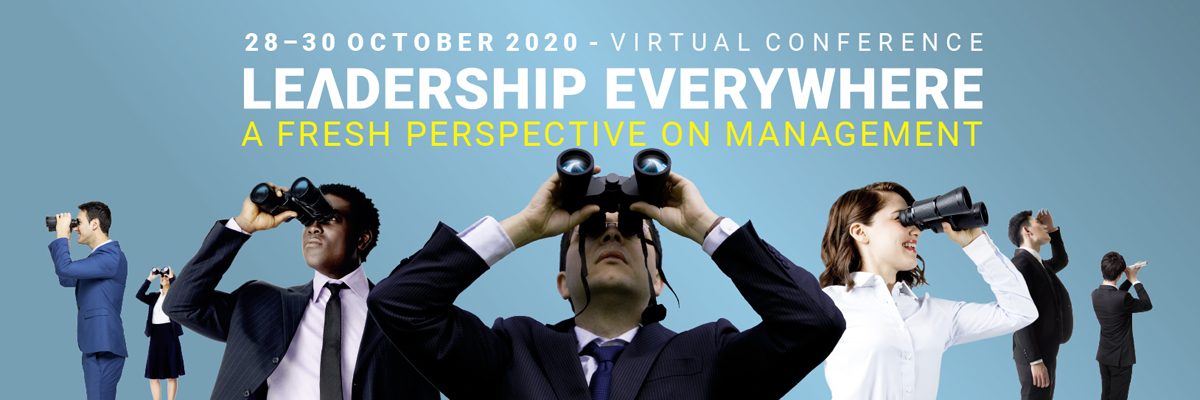
Not a classic panel, nor the speakers you’d expect at a conference like the Global Peter Drucker Forum. The motto: growth happens where there is access to opportunity. The format is targeted at younger-generation participants from two camps: the winners and finalists of the Peter Drucker Challenge, an essay contest for students and young entrepreneurs, and participants in the Talent Award program for corporate career talents nominated by their employers.
The shortened ‘Barcamp’ format used within the Global Peter Drucker Forum sees pitches by participants, followed by an audience vote to select the most popular topics that will then be presented in a short talk. Ample discussion time is provided thereafter.
To start off the Barcamp, moderator Isabella Mader cited Charles Handy’s closing keynote at the 2017 Drucker Forum: ‘To change the world let us start small fires in the darkness until the whole world is alight.’ The idea behind this session is to be one of those small fires and to spark further ones from the talks given and the ideas discussed with the audience in the session .
The voting brought seven young leaders to the stage with the following topics:
Ecosystems need eco-leaders, by Drenusha Shehu (Talent Award Participant, Raiffeisen Bank International): Industrial-age leadership was a lot about ego and lone decision making. Today, leaders need to be closer to the team, brainstorm ideas with their staff, and capture their input.
Words are losing their meaning, by Anika Marie Kennaugh (Drucker Challenge Finalist, Students): Peter Drucker knew about the magic, necessity and beauty of words. After all, words are what binds the world together or pulls it apart. Contracts, love letters, pitches, inaugural speeches … all rely on the magic of words. Even the success of scientific papers depends not only on the quality of the research, but also on the ability to convey ideas. But our “arsenal” is getting dull: students need someone to demonstrate how to polish their armour and brandish their language in order to become successful commanders-in-chief of their destiny.
Drucker Forum 2019
We need neurodiversity to encourage diversity, by Karolien Koolhof (Drucker Challenge Finalist, Students): When asked, ‘Who thinks diversity and innovation go hand in hand?’, a vast majority of participants raised their hands. Extroverts and introverts bring complementary talents to the table – fast action and introspection, boldness and calm. Recounting her personal story as an introvert, Koolhof explained how she came to build a platform to encourage introverts to embrace their natural strengths and extroverts to understand what introverts can contribute.
We might note here that the first
three speakers with the best voted pitches were young women – a first at the
Drucker Forum Barcamp.
Why become more data-driven? by Christian Renz (Talent Award participant, Raiffeisen Bank International): Corporate survival is not enough, argued Christian Renz. If companies are to excel, a data-driven approach is a crucial strategic ingredient for success. Basing decisions on data and information rather than taking a chance or relying on gut feel will improve the quality of decisions in two important areas: business development – finding opportunity and spotting patterns of consumer need – and generating efficiency.
What should the agenda be for AI today? by Babajide Muritala (Drucker Challenge Winner, Students): We all know AI is the ‘boss’ these days. In endless panels and chat shows, academics and pundits discuss control and the prospect of robotics and AI replacing human labor. But maybe this fear is misdirected. There is another AI apocalypse dawning that’s not talked about enough, which is algorithmic bias. Stories like a man getting 20 times more credit than his wife although she has a better credit rating illustrate the idea. What do cases like this predict for the surveillance of citizens, the militarization of AI, and so on? Let’s talk about discrimination by AI – and let’s not have AI take relevant decisions until this is fixed.
AI as the “third factor”, by Sorin Suciu, (Talent Award participant, Raiffeisen Bank International): The exponential development of business ecosystems has been largely supported by the development of artificial intelligence. In practice, the increasing application of digital technology has led to the emergence of a third factor in the business ecosystem: AI. The question to be addressed in this context: which is to be the dominant factor, AI or humans? Only responsible management of business ecosystems can ensure that the economy and society won’t be reduced to profit-making machines. Responsible management of AI will need to address the question of a life worth living.
Specialization kills management, by Shubhadeep Basak (Drucker Challenge Finalist, entrepreneurs category): In projects dominated by functional arguments about who is in charge of what and where silo thinking and blame culture govern behavior, lengthy discussions will delay completion and increase cost. Projects go astray. Managers capable of taking a holistic and inclusive view of both project and people are a crucial element in project leadership.
Questions discussed with the audience revolved much around inclusion and collaboration and the human condition, bound together by an improved ability to communicate with each other. As Financial Times management editor Andrew Hill pointed out, appropriately enough all the talks seemed to be linked by a sense of connectedness and collaboration. He proposed to take the ‘eco’ out of ecosystems and pursue systems thinking instead (a thought continued in a post Forum FT article), supporting the idea that problems are more easily solved by diverse groups. AI in this context should not alienate but facilitate collaborators to work together across continents and diverse groups.
About the Author:
Isabella Mader is CEO of the Excellence Institute, Executive Advisor for the Global Peter Drucker Forum and lecturer at universities in the fields of information and knowledge management, IT- strategy and collaboration.
This article is one in the Drucker Forum “shape the debate” series relating to the 11th Global Peter Drucker Forum, under the theme “The Power of Ecosystems”, taking place on November 21-22, 2019 in Vienna, Austria #GPDF19 #ecosystems
#GPDFrapporteur

